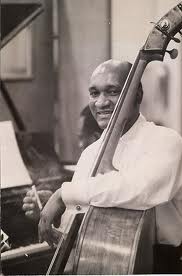
Oscar Pettiford
*Oscar Pettiford was born on this date in 1922. He was a Black jazz musician.
Born in Okmulgee, Oklahoma, of mixed African and Native American ancestry, he was one of ten children. His mother was Choctaw, and his black father was part Cherokee. At the age of three, the family moved to Minneapolis, Minnesota. Pettiford’s family had a band that performed around Minneapolis and St. Paul.
He first sang and danced in the band, and at the age of twelve, he began to play the piano and took up the upright bass at the age of fourteen. He graduated from Minneapolis North High School and played with the family band until 1941. In early 1943, Pettiford began to perform with saxophonist Charlie Barnett, who joined him on a tour that included a stop in New York. During this time, Pettiford shared bass duties in Barnett's band with Chubby Jackson.
In 1943, Pettiford recorded The Man I Love with saxophonist Coleman Hawkins and eventually settled in New York City. After arriving in New York, Pettiford attended jam sessions at Minton's Playhouse in Harlem, where he met Thelonious Monk and other bebop pioneers. Shortly afterward, Pettiford performed on 52nd Street in Manhattan at the Onyx Club in a band led by trumpeter Roy Eldridge with saxophonist Budd Johnson, pianist Sir Charles Thompson, and drummer Harold ‘Doc’ West. He also co-led a quintet, the Onyx Club, with Dizzy Gillespie, including saxophonist Lester Young, pianist George Wallington, and West. Don Byas and drummer Max Roach eventually joined the group. Differences between the members eventually caused the group to break up.
A short time later, Pettiford toured California with Coleman Hawkins’ band, which included Thompson, trumpeter Howard McGhee, and drummer Denzil Best. The Hawkins group appeared in John Hoffman’s 1945 film The Crimson Canary, although bassist Budd Hatch dubbed his performance on the soundtrack. From 1945 until 1948, Pettiford performed with Duke Ellington.
In April 1948, Pettiford performed with drummer J.C. Heard in pianist Erroll Garner’s trio at the Three Deuces Club. Through the end of 1948, Pettiford performed at the Three Deuces with trombonist Kai Winding and trumpeter Miles Davis. Soon after, Pettiford formed an all-star group at the Clique Club with Davis, trumpeter Fats Navarro, saxophonist Lucky Thompson, and Dexter Gordon, vibraphonist Milt Jackson, pianist Bud Powell, and drummer Kenny Clarke.
In 1949, Pettiford joined bandleader Woody Herman’s band. On one occasion, Pettiford was playing baseball with the Herman sidemen and broke his arm, severely limiting his activities over the next year. Throughout this time, Pettiford focused on learning the cello, often playing it with his arm still in a sling. He later incorporated the cello into his performances and recordings and is often credited for introducing the cello as a solo instrument into the jazz community.
After his recovery, Pettiford joined a long list of jazz greats, including drummer Louis Bellson and trumpeter Charlie Shavers, trombonist Jimmy Cleveland, saxophonist Jerome Richardson, pianist Horace Silver, pianist Phineas Newborn Jr., and more. From 1956 until 1957, Pettiford led his big band, highly regarded for its creative arrangements and instrumentation. The group's sidemen included Cleveland, trumpeters Art Farmer and Donald Byrd, French hornist David Amram, saxophonists Gigi Gryce, Sahib Shihab, and Benny Golson, pianist Dick Katz, and drummer Gus Johnson.
In 1957, Pettiford appeared on trumpeter Kenny Dorham’s album Jazz Contrasts. In February 1958, Pettiford was featured on Sonny Rollins’ album Freedom Suite. In September 1958, Pettiford toured France and Germany. In June 1959, he relocated to Copenhagen, Denmark. During the last few years, he performed on drums with saxophonist Hans Koller, guitarist Atilla Zoller, and Clarke or Jimmy Pratt. In 1958, Pettiford was involved in an auto accident that fractured his skull, though this did little to slow him down. 1958 Pettiford performed with saxophonist Stan Getz in Sven Methling's film Soldaterkammerater and Getz’s quartet at the Montmartre Club in Copenhagen until 1960.
Pettiford performed for the last time on Sunday, September 4, 1960, at an art exhibit in Copenhagen. The following day, he was taken to the hospital and fell into a coma. Pettiford passed away on September 8, 1960, in Copenhagen’s Fiedfrederiksberg Hospital at age thirty-seven. A Polio-like viral infection caused his death. One other source claimed that his death was caused by complications that stemmed from his auto accident two years earlier. Pettiford left behind a wife and three children.
Jeannie Pettiford
Voices That Guide Us Interview
African American Registry®